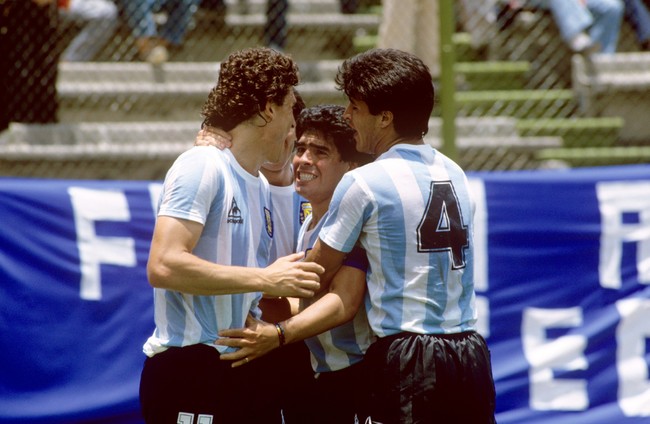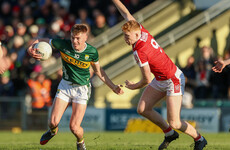1. At the 1986 World Cup, where he played as if in a state of grace, his genius reached its highest peak the day he defeated England. Here we find the words Homer applies to Ulysses, the same descriptions applied to the hero of the Odyssey: sagacious, cunning, astute, shrewd, artful, crafty, deceitful, tricky. Diego’s football was built on beauty, creativity, pride and bravery and, that afternoon against England, upon a deep feeling for Argentina too, as well as on his talent and awareness. Diego scored a goal that was stratospheric and another in which he cheated. And that is the best example of a phrase that gets used so often and in moments less appropriate than this: he was above good and evil.
Jorge Valdano writes an incredible tribute to his late captain and team-mate, Diego Maradona.
2. I played against him about half a dozen times in Italy. Learning not to engage him. It was like he was made of rubber. You could knock him, but he’d half fall over and get up again and be gone.
But something struck me again yesterday as I watched that amazing highlights reel of his performances during the 1986 World Cup. As well as the brilliant goals, and the little bit of Gaelic, there are all those chances he created for others, most of them missed. But you know what you don’t see after any of those misses? Maradona throwing his hands up in the air, having a go at his teammates. Up close, that’s how I remember him too.
I see it all the time now, prima donnas who couldn’t lace Maradona’s boots, making it clear their teammates aren’t up to their standards. Never from him. His teammates loved him dearly.
He was a great bloke to play against too. Sure, he’s got the reputation in England as a cheat, and he got away with one, but I never saw him as a cheat.
He never feigned injury, never went down looking to get somebody booked or sent off. He always bounced up on his feet and he was respectful of his opponents.
In the Irish Examiner, Liam Brady recalls playing against The Great Man.
3. That first goal exposed the cultural gulf between the two nations who had engaged in that strange, forced early 1980s war. In England, it went against all accepted rules of fair play. To Argentina, Maradona’s act was an act of stealth and opportunism: a bit of street craft which had hoodwinked the establishment.
The illegality of the goal hung over the match all of four minutes, until Maradona then received the ball in the centre circle, his back to the England goal and then announced that something . . . immortal . . . was on his mind with the lightning, casual turn which left two white shirts as good as dead. And he was off, racing through England, through dreams and into the bloodstream of the watching world. That year, he was the addiction.
Keith Duggan of The Irish Times explains Maradona’s allure.
4. The best perch is on the rooftop overlooking the stadium. Reaching it is not for the fainthearted: The only access is via an external staircase, and most of the field can be seen only if you sit right on the lip of the building. But still, during most games, a handful of hardy fans have made the journey up there.
If anything, others have had to be even more creative. Before one match over the summer, one group of fans hired a cherry picker, parked it outside the stadium, climbed into its basket, and then extended its hydraulic arm until they could see the field.
The stunt resulted in a fine for the club, but it was accepted with a laconic grin. The club’s executives understood that nobody in Bodo, a city of 50,000 people just north of the Arctic Circle, a 16-hour drive from Oslo, has ever seen anything like this; they know that, this season, people will go to extraordinary lengths just to see Bodo/Glimt play.
Rory Smith of the New York Times tells the story of Norway’s improbable champions.
5. The boys of last summer are the men of this winter.
Speaking of McKiernan brings us back to that picture from 1997.
Three years ago, on the 20th anniversary of that match, Brolly, who was playing for Derry in that match, posted the picture on social media. Most unusually, Gearoid replied.
“To experience this just once,” he typed, with an accompanying downcast emoji.
The towering McKiernan, famously shy off the pitch, was clearly weary. Weary of the battle, of the hope and expectation and resulting crushing disappointment. Weary of losing. Weary of doing everything right and getting the wrong result.
Tonight, that cycle has been broken and, here and now, the present is blue. Gearoid got his wish and in his 10th season, played the football of his career.
Twenty-three long and hard years on and Cahill’s words come whispering again on the breeze: a new era has begun. And this time, it’s for real.
Paul Fitzpatrick of the Anglo-Celt salutes Cavan’s Ulster Championship triumph.
6. My abiding memory of Power down the years is of seeing him standing outside Semple Stadium on big hurling days in the summer, shaking a bucket with Friends Of Tipperary Football on the side of it.
He would have been minor manager or under-21 manager at the time, and the people walking past him were invariably about to watch at least a few footballers who’d been through his hands walk in the parade for the hurlers.
Rattling his bucket for a few crumbs to keep his teams alive as a going concern was the kind of thing plenty of passers-by would admire. Good man David, fair play to you, keep it going. But to most of them he might as well have been collecting to save a rare species of badger. Tipp football? Well sure, if you’re into that kind of thing.
Malachy Clerkin writes of the ending of respective famines in Tipperary and Cavan.











Gilroy is one of those players who should really have more international caps than he does. Hes been very unlucky in my opinion.
@Rudiger McMonihan:
Unfortunately for him his all round game is just not up to international class.
I fear that unless Adam Byrne improves his defence he will become the new Craig Gilroy but there is no doubt going forward they are impressive.
You’d worry for Ulster with that backrow. Marcel Coetzee and Jean Deysel always seem to be injured.
I wonder would Leinster have a backrow or two to spare for up north?
@Culture At War: Matt O’Connor was apparently in town this week talking to three Leinster and Ireland players about signing for Leicester Tigers next season. If Nucifora is doing his job properly, he should be making sure we keep our talent here rather than letting other talents leave like Zebo.
@Paul McCutcheon: why would any Irish forward want to play for that crash bang wallop merchant. 2 season playing for him will take 3 season of your career
@Chris Mc: Didnt stop Dominic Ryan going to them and putting any international ambition aside, rather than move North were he would have be greatly appreciated and got plenty of gametime.
@Kingshu: Agreed. Looks like Ryan is going to do a Marty Moore.
Surely Peter Nelson should be getting a start at out half in games like these? Ulster will be in real trouble when CL leaves in the new year.
@Captain NerbNerb: Should be they clearly they are banking on the outcome of the court case.
I was very impressed with McBurney performances for the U20’s over the last two years. He seems to have put on some mass which he needed to add to his already impressive technical skills at both ruck and line out time. In a position that has a load of questions marks for Ireland going forward if he continues to impress and develop his game all the better for Ulster and Ireland. At 21 and having been in the same environment with Best he has the time and guidance.
@Ian Verdon: Tbh John Andrews has a fair turn of speed which never seems fully utilized. If he was brought in the 7s program it might help him develop better footwork and handling skills.
there isnt one decent forward in that pack
@Tommy Bread: Reidy, Henry & Treadwell are all Irish internationals.
@Tommy Bread: disagree, you obviously don’t watch them regularly.
All this fake news circulating !!!
I could have sworn that Ulster announced weeks ago that they had signed a South African loose head forward.
I must be wrong, but then I have this memory of the Ulster management over the last 3 weeks saying something alone the lines of a new prop making his debut this weekend but where did he go.
Maybe they could tell us for real if he is fit or not.
Will he play soon, play this year, this season or is he banjacksed
@Mark Smith: Absolutely. Is it or is not another B@!!s up?
The Kings only real threat is in the backline. If Ulster hope to go there and play expansive sevens style rugby they could be in for a shock! Win the battle up front and when the game is in the bag do the fancy stuff.